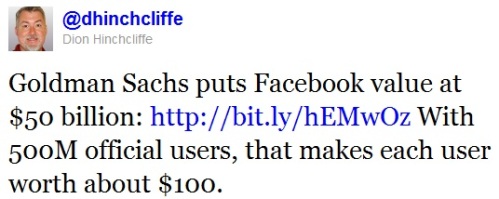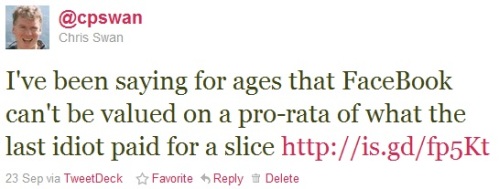Bubble 2.0
I had the misfortune of missing most of the first Internet bubble. Although I’d got into the Internet before there was a World Wide Web I’d signed my life away to the Royal Navy (in exchange for a great education and generous financial package). Thus I got to spend the two years it took between resigning from the Navy and escaping to the outside watching everybody else do lots of cool things (and in some cases getting rich whilst doing those cool things).
I caught the tail end of the whole thing by joining a .com consultancy firm in early 2000. I remember now clearly the moment that I realised that the Internet had become an investment bubble rather than an economic miracle. It was in the wake of the AOL Time Warner merger, and I was in the pub next door to the office discussing with my colleagues the merits of ‘clicks and mortar’ versus ‘bricks and mortar’. I’d known the web since its birth, and none of this made any sense to me.
I had a similar epiphany the other day when it was reported that Goldman Sachs is investing $450m at a $50Bn valuation. Madness.
Dion Hinchcliffe sums things up perfectly:
There are clearly two things wrong with this picture:
- User based valuations are relics of the web1.0 bubble, and were contrived for situations when companies weren’t actually making any money by any normal measures[1].
- How can the average Facebook user possibly have a net present value of $100 to the company?
To be fair it wasn’t really an epiphany. I’ve been short on Facebook and its ecosystem (particularly Zynga[2]) for some time now.
To be fair on Goldman Sachs I don’t think they’re idiots – far from it – though I do think it’s likely that they’ll flip their investment (sooner, whilst the company is still private, or later, after the long awaited IPO[3]).
The main point here is that I use these services. I know people who use these services. I even spend money on these services – just not enough to get into the same order of magnitude as $100.
The other key thing is that I like Facebook less now than I did before. For a while it felt like the school playground – a few rough edges, but fun. Now it feels like a shopping mall – all shiny, superficial and nothing that really captures my interest. Of course my friends are still there, and I can chat to them, but we could do that on Twitter or Gmail or Skype.
‘But what about advertising?’ I hear you cry. Facebook makes its money from advertising just like Google. Google is an (almost) $200Bn company, with revenues of around $28Bn. Facebook has even surpassed Google for page impressions, which is where we find the heart of the problem – Facebook is working a lot harder than Google to make a lot less money. That doesn’t make it worthless, just worth less – somewhere around $14Bn if we think Google is a reliable comparison.
The other thing to worry about is growth. Google is going through that painful transition from being a growth company to a cash cow. From a corporate structure perspective I think life will be easier at Facebook, but for the balance sheet things are less rosy. When you already have most of the world population that could use your service already using your service then that’s not a growth story. Of course the internet will continue to expand its reach, but those new users will be $1 users not $100 users.
So when will the bubble burst? I’d give it 2-3 years if the company stays private, less if an IPO happens in the next year – there’s nothing like having Wall St analysts picking over something to bring on a sudden dose of reality. Do I think an IPO would be a disaster – only for those buying the shares.
[1] Facebook is making real money- revenue of approximately $2 billion, with roughly $400 million in profit. That means it has real value. The problem is simply a disconnect between present cash flows and views on future cash flows.
[2] Who haven’t had a hit since Farmville, and where the miracle of ‘social gaming’ seems to have turned to an advertising symbiosis (deadly embrace?).
[3] One way that many of Facebook’s users could be worth substantially more than $100 each is if they can be persuaded to buy stock ;-)
Filed under: technology, wibble | 14 Comments
Tags: bubble, Facebook, google, investment, IPO, social networking, valuation, Zynga


And moments after posting I read this in the NY Times – Why Are Taxpayers Subsidizing Facebook, and the Next Bubble?
and then this great piece in the Wall Street Journal comparing some of the Facebook investment pitches to 419 scams
and more from the WSJ – Facebook Versus Google Circa 2004
and even more from the WSJ – Why the Fuss Over Facebook Doesn’t Make It a Home Run with some specific commentary on valuation.
CNN also sees echoes back to AOL
To expand on [2], CityVille is now pulling more daily active users than FarmVille after being released approximately 3 months back. I don’t think it’s as high as the FarmVille DAU peak, but it’s really not far off. It’s also developed (in part) by some guys I used to work with at EA, so they know how “real” games work – it’s certainly not just about dodgy backdoor tactics and advert spam anymore.
I agree that Zynga (and Facebook) are imho massively overvalued – I guess we’ll find out soon enough just how far out the estimates are. Unlike most of the dotcom bubble companies, at least they both have positive cashflow and most of the scale issues ironed out.
“But what about the advertising!?!” is about where i sit. Disclaimer; i hate Facebook’s penetration of the internet & society, I hate Zuckerburg etc, but given the current (600M) and projected (1B+) userbase, and HOW GOD DAMN LOYAL THOSE USERS ARE, advertising would seem to be a huge source of revenue moving forward.
Facebook steals ideas. Status? Twitter. Checkins? Foursquare. The problem for me is the “mainstream” world loves when they steal good ideas because they are perfectly OK if the internet becomes a place where you never have to leave the facebook.com domain.
Five years ago, “smartphones” (WM5, BB) were for execs and nerds. Now every teenage girl and her mum has one, i’d say primarily because of the Facebook app. I never ever see a female using a smartphone for anything other than Facebook.
Anyways, with the success of GroupOn (hyperlocal), Checkins is going to become huge and theres $ to be had there. The writing is on the wall RE: mobile gaming and mobile in general; Facebook is poised, perhaps better than any, to capitalize on this. Add to that any other new idea that becomes prevalent which Facebook will emulate with great success AND the advertising revenue they will get from having the whole western world’s 14-45 year old demographic using their website every day and I can see why some “Wall Street analysts”, who are probably avid FB users themselves, value so ridiculously high.
The only fun part about this little ‘scandal’ for me is exactly what you already note; the exclusivity will piss a lot of people off.
A great piece by JP Rangaswami on why I might be wrong The new new telco
Nice points Chris. Also check this post out: F@#k Facebook – Goldman Sachs’ $50billion valuation is BS http://ht.ly/3zrPR (via @Jbishara)
Thanks Alex. It seems that Jason and I are thinking along the same lines.
I’m intrigued by his point about Facebook being a time sink. Maybe it’s the new new gin (where TV was the new gin, at least according to Clay Shirky and his opening chapter to Cognitive Surplus)?
Techdirt have an interesting exploration of what’s going on from a markets/regulatory perspective – Facebook, Goldman Sachs & How Money Seeks Regulatory Free Zones
What I find interesting here is that many of the same points could be made about the early days of the hedge fund industry (whilst it was still delivering returns well above mutual funds).
Don Dodge points out that comparisons are tough Facebook, Google, Microsoft – comparable? and also highlights that the early adopter geek user experience may differ from what millions of others are doing (he doesn’t click on ads either).
and there are plenty of other pundits out there with a point of view on this one – If You Could Short Facebook, Would You?
Fred Wilson seems upbeat, but conflicted about Facebook in The Second Coming Of The Internet IPO